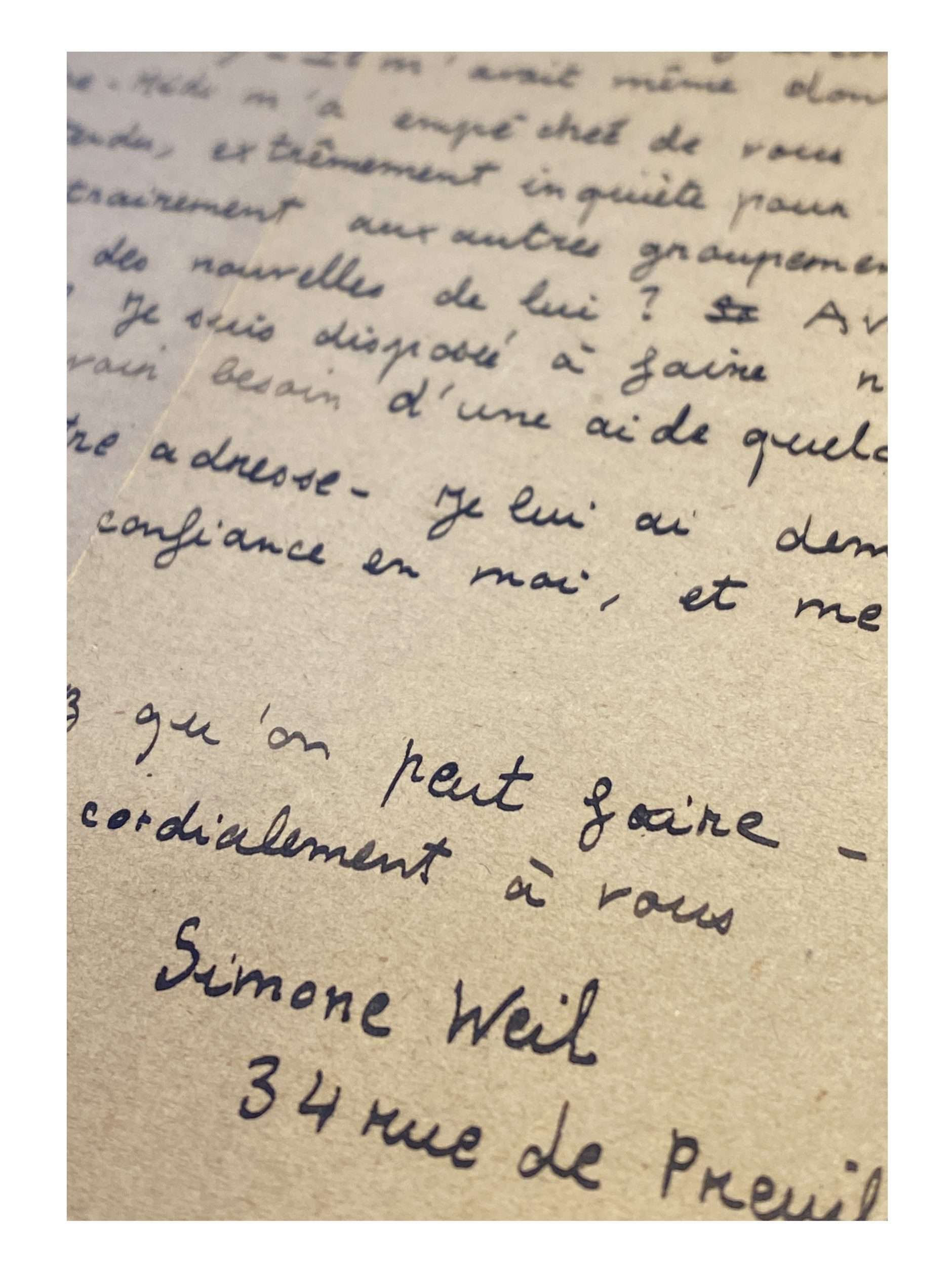WEIL, Simone (1909-1943)
Autograph letter signed “Simone Weil” to Henri Guilbeaux
Auxerre [Autumn 1932], 1 p. in-4to
“At the moment, I am, of course, extremely worried about the comrades in Berlin”
Fact sheet
WEIL, Simone (1909-1943)
Autograph letter signed “Simone Weil” to Henri Guilbeaux
Auxerre [Autumn 1932], 1 p. in-4to oblong
Lower margin cut diagonally, without affecting the text, usual fold marks, some small ink stains
Very rare letter from the philosopher showing her unwavering support to her comrades in the Socialist Workers’ Party of Germany, opponents of Stalin’s Comintern – This document reveals, beyond her deep humanism, the precautions used by Simone Weil to obtain the confidence of her correspondent by an intermediary
“Cher camarade,
Excusez-moi de vous écrire sans être connue de vous – j’ai connu [Paul] Frölich durant mon séjour d’un mois à Berlin (en août) – il m’avait donné une lettre pour vous, que votre détention au cherche-midi m’a empêchée de vous remettre.
Actuellement, je suis, bien entendu, extrêmement inquiète pour les camarades de Berlin, et notamment pour Frölich […] Avez-vous des nouvelles de lui ? Avez-vous une idée de la manière dont on pourrait en avoir ? Je suis disposée à faire n’importe quoi de possible pour l’aider, s’il se trouve avoir besoin d’une aide quelconque (argent ou autre chose).
C’est [Marcel] Martinet qui m’a donné votre adresse – Je lui ai demandé de vous écrire pour vous assurer que vous pouvez avoir confiance en moi, et me dire tout ce que vous savez.
Dites-moi aussi ce que vous croyez qu’on peut faire.
Bien cordialement à vous
Simone Weil
34 rue de Preuilly
Auxerre (Yonne)”
Paul Frölich (1884–1953) was a German journalist and socialist-revolutionary and communist leader. In 1922 he published a pamphlet in French: La Terreur blanche en Allemagne (Petite bibliothèque communiste, Paris). He was one of the leaders of the K.P.D. (Kommunistiche Partei Deutschlands), before creating the Sozial Arbeiter Partei (S.A.P.). Elected deputy to the Reichstag (1921-1924, then 1928-1930), he was arrested in 1933 and detained in a concentration camp for nine months (Simone Weil, who went so far as to foment escape plans for his comrade, sent money to pay for a lawyer).
The “comrades” in Berlin for whom Simone Weil is worried are above all the “oppositionals” (i.e. those who wanted a recovery of the German Communist Party) that she knew during her stay, and who fight against the apparatus of the Comintern Party and the Russian state. On her return from Germany, Simone Weil sought to help political refugees who were not part of either International and who, therefore, did not receive any assistance. She organized a number of successive accommodations with her parents (to the great despair of her father… who still accepted though).
“It was Martinet who gave me your address”
Simone Weil met Marcel Martinet (1887-1944), through Michel and Jeanne Alexandre, founders of the Libres propos or Journal d’Alain, in 1921. Author of Les Temps maudits (1914-1916), Martinet was close to the Libres Propos team and was actively involved with anti-fascist intellectuals. In 1918 he founded a pacifist magazine, La Plèbe. First literary director of L’Humanité (1921-1923), he resigned and left the P.C.F. to fight with the core of syndicalist militants grouped by P. Monatte around The Proletarian Revolution.
Unpublished letter
